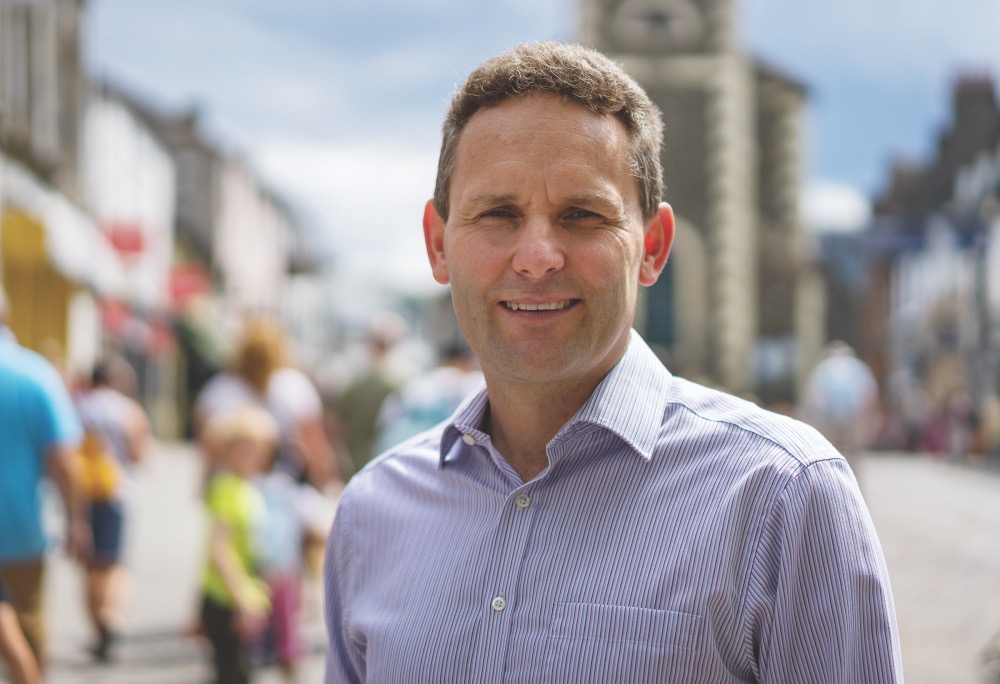
DAVID ADAMS speaks with Matthew Skirton, chief executive of Christian mission organisation OM in the UK, about the organisation’s research into the “mission gap” and its hopes that more Christians will engage with the idea of cross-cultural mission…
Fewer than one tenth of one per cent of Christians around the world are engaged in cross-cultural missionary work. And, of the less than two per cent that give any money to Christian causes, less than six per cent of it is dedicated to furthering such work.
Those stark findings – which can be found in OM’s report, The Mission Gap – are something that the global mission organisation aims to change.

OM helps to equip people from all over the world for mission. PICTURE: OM
Matthew Skirton, chief executive of OM (also known as Operation Mobilisation) in the UK, says that while it’s difficult to ascertain the overall global picture when it comes to sending out cross-cultural missionaries, there was no doubt in the UK the numbers of those Christians who were engaged in such activity had dropped even before the coronavirus pandemic saw travel restrictions and lockdowns limit missionary activity around the world.
“In the UK…over the last couple of decades, less people are willing or considering crossing cultural and geographical borders to go and share the Good News. There are less Christians who are open to consider that, and that’s, I suppose, why we’re emphasising this ‘mission gap’ now here in the UK – and I would have a guess that Australia [is], and I know the US is, in a similar situation, with less people willing to go long-term and to live out their lives among the least reached.”

Matthew Skirton. PICTURE: OM
“When we talk of the mission ‘gap, we’re talking of the 2.1 billion people who have never heard, where there is no Christian witness. So I suppose the Mission Gap [project] is especially focused on the divide between what, in theory, we understand from God’s Word – ‘to go and make disciples of all nations’ – and the reality that today, there’s 2.1 billion people who live in parts of the world where there’s no Christian witness.”
Skirton, who spoke to Sight over the phone from his home in Shropshire, England, says the term ‘mission’ can include any outreach that is “proclaiming or demonstrating the love of Christ” and that, of course, includes mission focused on local communities in Western nations like the UK.
“But when we talk of the ‘mission gap’, we’re talking of the 2.1 billion people who have never heard, where there is no Christian witness. So I suppose the Mission Gap [project] is especially focused on the divide between what, in theory, we understand from God’s Word – ‘to go and make disciples of all nations’ – and the reality: that today, there’s 2.1 billion people who live in parts of the world where there’s no Christian witness.”
Drawing on research which included 21 focus groups involving people in seven countries including Australia, Brazil, Chile, Germany, Ghana, Hong Kong and the US, the Mission Gap report identifies some of the common barriers preventing people from engaging with the idea of cross-cultural mission.
These include the research’s findings that the majority of Christians around the world are “unaware that they are called to use their full life, gifting and time as a worker for God’s mission – to share His love with those who haven’t experienced it”.
“It seems to be that there is less knowledge of the command – our marching orders – to ‘Go and make disciples of all nations’ than there used to be…” Skirton notes. “I remember growing up in a church in the south of England where we would often have mission speakers in our Sunday School, in youth group, [and] that would be one of the Bible verses we would memorise – Matthew 28:19-20. If you asked the average person 20 or 30 years ago in some of our Western churches, ‘What is the Great Commission’, more people would be able to say then it is to go and make disciples of all nations. Now, the Barna Group did a survey in the US – and I believe it is reflective of much of the West – [which showed] the knowledge of the Great Commission and the calling to go to the ends of the earth with the Gospel…has decreased. Less people know of the calling to go.”
One reason for that, Skirton posits, could be the apparent shift over the past couple of decades when it comes to people’s commitment to their faith.
“Perhaps – and we’re talking pre-pandemic…but, perhaps, it’s because it’s become too easy to be a Christian in the West. Life is – and again, pre-pandemic – easier for folks. It’s easy to tick the box and be a Christian and to go along and have a wonderful time of worship on Sunday morning and then go about your life…[But], of course, we do understand from the Scriptures, that Christianity’s more than just attending a great lively church on a Sunday morning.”
Skirton suggests that the reason behind the change is the lack of depth of discipleship and commitment to Christ among many Christians.
“I think, for example, of Isaiah in chapter six when he goes to worship in the Temple – he had a glimpse of God and then he falls on his knees, he repents of his own sins and the sins of his people, and then he says ‘Lord, here I am, send me’. Isaiah didn’t need a missions challenge or clever PowerPoint giving the statistics – Isaiah had a glimpse of God and when he saw God, he was ready to say ‘Lord use me to make a difference’. Is that the bottom line problem in our churches, the reason for this gap? [Is it about] a lack of a knowledge of God, a closer walking with Jesus?”
<p><a href=”https://vimeo.com/439142282″>The Mission Gap</a> from <a href=”https://vimeo.com/omaustralia”>OM in Australia</a> on <a href=”https://vimeo.com”>Vimeo</a>.</p>
Skirton, who along with his wife Helen (and, over time, their five children), pioneered OM’s mission work in the eastern European nation of Moldova for 23 years prior to returning to the UK in 2015, believes there could also be an issue around the perception of what a missionary is.
“Probably some of us serving in mission agencies have been guilty of perpetuating this image – you know, the missionary comes back from the mission field and shows some slides or a PowerPoint presentation and, if people are still awake, they’re kind of in awe – ‘Oh, wow, that’s so amazing’…There is the possibility, then, that people look at the missionary up front and think, ‘Wow, we’ll pay so that person can go and do the ministry’.”

He says a similar concept can take hold when it comes to pastors or youth workers – they’re seen as the “employed workers who have to do the work” while the “rest of us” have a calling to perhaps pray and, of course, do our best to share our faith with people in our local community.
“So maybe there’s been that problem that we have put on a pedestal full-time Christian workers,” he says. “That’s actually a phrase that I try not to use any more…because we all, really, should be full-time Christian workers. I mean, my understanding Scripturally is that we are all, if we are followers of Jesus, missionaries because we are mission, we are sent ones, we are sent to go about God’s mission for the world…
“When we understand that, that we are all sent, the question isn’t ‘Should I witness to the Good News of Jesus?’; the question is ‘Where is God calling me to witness?’…It might be crossing the street, it might be with our neighbours, with our family, with our friends, but it might be – when we start to recognise the needs of the lost around the world… – those who have never had the opportunity of hearing.”
Skirton says it’s important to recognise there are different ways of being a cross-cultural missionary. While he believes there’s a place for the traditional supported missionaries who are sent out by their church to impact another culture, he also talks about the different ways in which people are being sent out, such as those who might go to a nation with unreached people as a professional working in their field and share the love of Christ with those they meet.
“So I believe there’s not going to be a one-size fits all,” he says.
The focus groups brought together for the Mission Gap research also revealed fear was a significant barrier to people undertaking cross-cultural mission work, specifically the fear of sacrifice – what people might have to give up to undertake such a job, the fear of failure, and the fear that people serving as missionaries overseas might not be safe.
“I think these fears have always been around…” comments Skirton. “But a depth of commitment to Christ will overcome these fears that people may have….A lot of discipleship and equipping, helping folks understand who they are, who we are in Christ, will help…”
The research also identified the need for better communication around the issue of cross-cultural mission.
“Certainly in the younger generation in the countries where we have done this research, there seems to be a groundswell of wanting to unite around a cause – young people seem to be very passionate about justice issues…” says Skirton. “So the findings are nudging us in the direction of how to better communicate the need, especially to this next generation.”
But Skirton adds that while this could mean adopting strategies to better connect with young people including, perhaps, better use of social media, “primarily, let’s communicate the beauty of knowing Christ and living with Him.”
“And if we do that – and people truly glimpse God and His Son, Jesus Christ, and His transforming power in our lives…maybe we don’t need to try and be clever and persuade people…because people will want to go when they hear and when they experience truly the love of God in their own lives.”
Skirton says that with the number of the “least reached” people around the world growing, the need for cross-cultural mission is greater than ever.
“What will it take for us to see the change in trajectory? It will take people who are willing to step out of their comfort zone, go and live their Christian lives among the least reached,” he says.
“But we’re talking significant numbers…I think it will take a mission revival in Latin America, in sub-Saharan Africa, in parts of East Asia where the church is flourishing as well as, perhaps, a revival in what we’ve called Western countries in the past – Australasia, parts of Europe and North America. I think it will take the global church [to have] a revival and a revival, not just in personal and local growth of the church, but in a vision for going to the least reached…It’s for the church as a whole to be shaken and I wonder, through situations such as this global pandemic, is this something that can shake us, can wake us up to the realities of what’s important?”
For resources from The Mission Gap project – including the report with case studies and tools for church and ministry leaders – head to missiongap.org.





